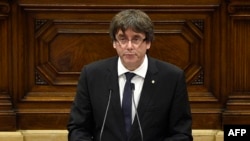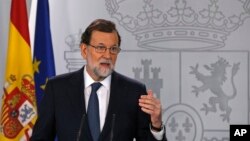Spain has rejected calls for talks or mediation to resolve a dispute over independence with the northeastern region of Catalonia.
In a speech to parliament Wednesday, Spanish Prime Minister Mariano Rajoy said there can be no mediation “between democratic law and disobedience and unlawfulness.”
Rajoy spoke one day after Catalonia’s leader, Carles Puigdemont, announced plans to move forward with a declaration of independence from Spain.
In a speech Tuesday, Puigdemont said the declaration would be carried out following results of a referendum held in Catalonia October 1. However, he said he wanted to delay the action for several weeks to allow for possible discussions with the government.
Spain’s government and Constitutional Court declared the referendum illegal. Independence movement leaders said more than 90 percent of those who voted supported independence. About 43 percent of voters took part in the referendum. Opponents said they would boycott the vote.
Nearly 900 people were injured in clashes with Spanish police who entered voting stations to stop people from voting.
Independence or not?
On Wednesday, Rajoy demanded that Puigdemont clarify whether or not Catalonia’s independence had been declared. The prime minister said the Catalan leader’s response would be important in deciding “events over the coming days.”
Rajoy’s comments were seen as an indirect threat to Catalonia that Spain could move to limit or suspend the region’s political autonomy if independence is in fact declared.
Spain’s constitution permits the central government to take some or total control of any of its 17 regions if they don't fulfill their legal obligations. The process would begin with a cabinet meeting and warning to the regional government. The Senate could then be called upon to approve the measure.
The EU and most of its 28 nations have not backed Catalonia's independence movement. EU leaders have expressed support for Rajoy and called on the independence movement to “fully respect Spanish constitutional order.”
Experts say EU officials are fearful that supporting Catalonia could open the door for many other independence campaigns across Europe.
Bryan Lynn wrote this story based on reports from VOA News, the Associated Press, Reuters and Agence France-Presse. Hai Do was the editor.
We want to hear from you. Write to us in the Comments section, and visit our Facebook page.
_____________________________________________________________
Words in This Story
mediation – n. process to find a solution between two or more people who disagree about something
disobedience – n. refusal or failure to obey rules or laws
clarify – v. make something clearer or easier to understand
autonomy – n. existing or acting separately from others







